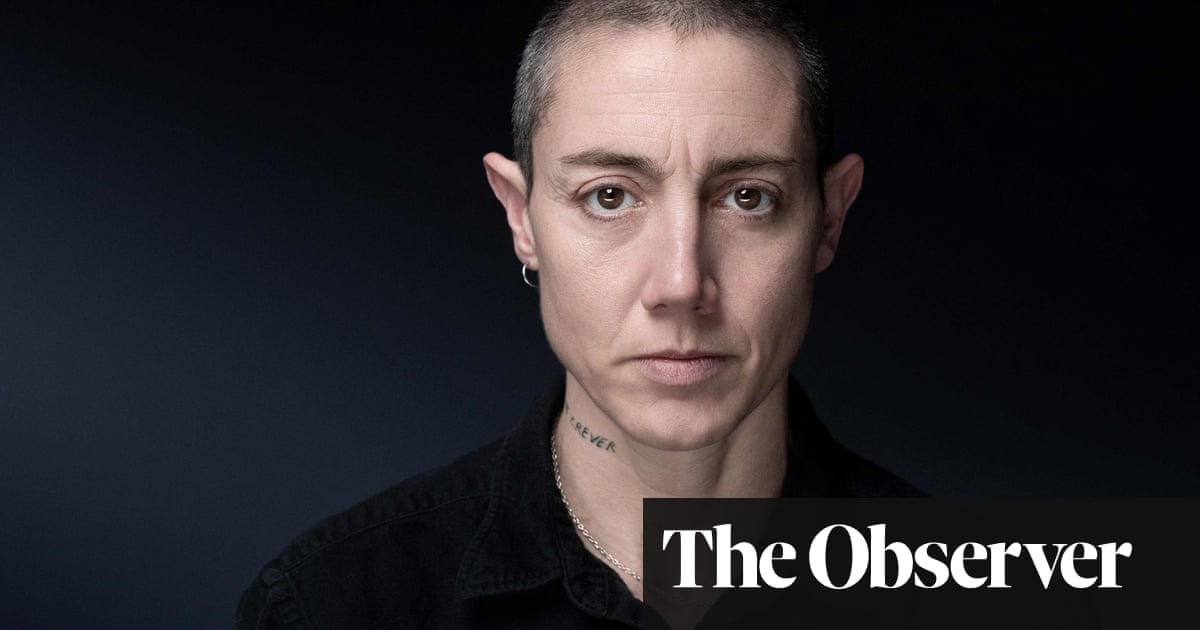
“There’s always a price to pay for freedom,” says Constance Debré, running a hand over her shaved head and her neck tattoo that reads “plutôt crêver” (“rather die”). The 50-year-old author, who faced a fierce custody battle over her young son after coming out as gay in her mid 40s, adds: “To me, that’s a happier, livelier way to see things: rather than saying there are injustices or blows raining down on you, you realise it’s all because you’re living life in the way you want, seeking out an existence … trying to give life some shape. That’s why life and literature are so connected: it’s the quest for form.”
Debré tore up the rule book of French writing with a bestselling trilogy based on the dramatic turn her life took after she came out. The darkly comic, first-person account of a separated mother’s Don Juan-style conquests of women is interwoven with scenes of her “taking an automatic rifle” to her bourgeois life as a criminal defence barrister from a famous French political dynasty. More than a coming-out saga, Debré likens it to a Saint Augustine-style conversion, a total transformation. The protagonist and narrator, who is not named, is clearly Debré herself, following in a long French tradition of creative writers who draw closely on real-life events – the most notable being last year’s Nobel laureate Annie Ernaux. Yet though the events are real, Debré firmly considers her work fiction rather than autobiography or memoir, because it relies on the literary art of constructing a narrative, creating a relationship between a character and events. “What makes a novel is its form,” she says.
Just as Debré did, the narrator leaves the smart neighbourhoods of Paris where she grew up, abandons her job and possessions, and lives nomadically while reflecting on the arc of her life – from the opium and heroin addictions of her aristocratic parents, and her mother’s sudden death when Debré was 16, to her work in court defending drug dealers, murderers, rapists. The first book of the trilogy, Play Boy, won the Prix de la Coupole in 2018, and since then, every Debré publication has been a major literary event.
Love Me Tender, the second novel, is so raw and fast‑paced that it stands alone. It is Debré’s first book to be published in the UK, in a translation by Holly James, and draws on her estranged husband’s attempts to stop her seeing her young son, arguing in court that her new life as a lesbian and a provocative writer made her unsuitable as a mother. The court eventually finds in her favour, but not before years tick by in which she is allowed only sporadic supervised visits with her son at a family contact centre. The battle against the family court system reads like a thriller, a race against time to stop the mother‑child relationship fading out.
There is an absurdity at the heart of all this – that Debré had to pay such a price for coming out as a lesbian in well-heeled Paris. When she “switched” to female partners it was a few years after same-sex marriages were legalised in France. “We all think we live in an extremely free society,” she says. “But the events in this book show that when someones changes category, it’s not always easy.”
We meet in Belleville, northern Paris. In Love Me Tender, Debré describes her protagonist’s imposing presence – tall frame, leather jacket, tattoos, icy stare – as a cross between Marcel Proust’s Baron de Charlus and the Sex Pistols’ Sid Vicious. She is extremely polite, and hates the fact that she has never been able to shake that part of her upbringing. She’s just back from a writer’s residency in Los Angeles and says she has fallen in love with the city. “There’s a melancholy in LA which isn’t at all the same as the melancholy of Paris. Paris melancholy is sad and dark. In LA, the melancholy has a kind of softness.”
For Debré, style is what counts. Hailed by French critics for her slap-in-the-face narration, she strips the French language back to its most crude and colloquial, subverts punctuation and deliberately goes against the current trend in French writing for plunging into psychological explanation.
“I wanted a style that would be the least verbose, very direct, fat-free, efficient – with as little psychology as possible because I absolutely detest that. I had in mind that well-known photograph by William Eggleston, a naked bulb on a ceiling – just a bulb and three white cables in a red room. It’s banal and it has an incredible strength. I wanted to get back to that concept, which we’ve had in music, art, photography for 50 years. You find it less in literature, at least in French writing, which is deliberately delicate. I wanted to grab events and grab the reader.”
She is relieved that English-language readers might come to her unencumbered by the baggage of her famous surname – the final novel of her trilogy, Nom (Name), is about the need to escape that legacy. She was born into a French political dynasty labelled the “French Kennedys”. Her grandfather, Michel Debré, was Charles de Gaulle’s prime minister and wrote the modern French constitution. Her great-grandfather, Robert Debré, is seen as the founder of modern pediatrics and has a Paris hospital named after him. Her uncles were ministers. Her father, François Debré, was an award-winning war reporter who returned from his assignments in Asia with an opium habit. Her mother, a fashion model, came from an eccentric aristocratic family which had fallen on hard times, but whose women were tough, liked hunting and driving fast. She gave Debré her first rifle at 15.
If the famous Debré men wrote the laws of France, Constance, as a criminal lawyer, defended those who broke them. Criminal law, she feels, is where you can find “all the most violent truth of existence”. Her next novel, Offenses (Offences), out in France in February, traces the story of a murderer and is also drawn from real events.
Love Me Tender is at its heart a book about injustice. But for Debré, the ideal of justice is very different from the working judicial system itself, which she sees as skewed towards the powerful and rich. “The justice system is a fiction … it’s about designating what’s ‘bad’ in order to place the society we live in on the side of ‘good’. There was something amusing in the not-at-all amusing fact of having worked in that justice system and now finding myself put in the role of accused ... But all forms of role-reversal are interesting.”
The novel, in all its punk rebelliousness, picks at notions of motherhood and unconditional love. Debré feels that people talk of love in families as if it’s fixed, never changing. She wanted to ask: what if it all falls apart?
“Just the expression ‘unconditional love’ is very interesting, it’s a way to totally close the box as if saying: ‘Ah, that’s unconditional love, it’s all worked out, no need to talk about it,’” she says. “All of us have a tendency to not know what we’re feeling, so the first reflex is generally to take up society’s discourse ... When you go to the park, you often see mothers – fathers too – who are speaking slightly falsely to their children, as if they’re speaking to an audience, performing. It’s terrible, it reveals a great anxiety. There’s a violence to this discourse that turns people crazy, parents and kids. Family is the place for madness, that’s for certain.”
She is matter-of-fact about childhood, in particular her own. In the trilogy, her parents openly get high on opium, saying not to tell her teachers. They progress to heroin, which makes them pass out and “burn their sheets with their cigarettes”, and, when they can’t afford drugs, whisky. It leads to her mother’s early death and her father’s continual failed attempts to detox. Debré feels it was “formative” and she was lucky to have “bourgeois addict” parents. “I’ve always been very surprised about the way that other people talked about my childhood, because I was very happy to have the parents I had, there were a lot of sad stories in all of that, but I owe them a lot.”
If she likes flipping things around, seeing the positives, it’s “not just for the sake of contradiction or to be provocative,” she says. “But because there’s truth to be found in looking at things upside down.” The difficult story of her relationship with her son could have positive elements in it too, she says, perhaps for him. The eight-year-old boy – named Paul in the novel – is stopped from seeing his mother for months. He goes from hiding under the duvet at his father’s flat and refusing to acknowledge her, to the unexpected tenderness of their initially shy supervised meetings, in matching plastic armchairs, where they hug and “exchange news from afar like bad actors”. The court-appointed psychiatrist declares, “Of course you love Paul, of course Paul loves you, of course you’re not crazy,” but shrugs as he says this sort of legal battle “happens all the time” when one parent comes out as gay, usually the father, and can take years to make it through the court system. She hints that her real-life relationship with her son is better now, and that he is doing OK.
“It’s very rare that things are only negative, or only painful,” she says. “Freedom is how you choose to view events, at least as much as the events themselves … Everything is intertwined, that’s what existence is – it’s not just blocks of sadness or blocks of happiness.”
In Love Me Tender, the fact of losing her mother young is mentioned in passing. “Loss is everywhere in existence,” she shrugs. “And maybe the way to take the drama out of loss is just by saying it’s there. Like ‘Oh, there it is,’ and just go on to something different in the next phrase.”
Her writing is also about her body: never taking drugs, compulsively swimming every day in public pools, just as the criminals she once defended pumped iron in jail. She gets tattoos that, she writes in her first novel, shouldn’t be about beauty but like “graffiti on a toilet door”. She writes of having “Son of a Bitch” inked on her stomach. Tattoos “are something about prisoners, sailors, people who have had hard lives and who have nothing else to count on,” she says. “They have no home, not much else. So they have to cling on to the only material thing left – the body.”
Debré’s depictions of sexual encounters are also key. In Play Boy, these explore the discovery of gay sex. In Love Me Tender, they serve a different purpose, she says. The sexual encounters are placed against the backdrop of the family court battle, where the expectation is that the narrator will resume her respectable lawyer’s life. Instead, she behaves like a promiscuous “lonesome cowboy”, doing whatever she pleases, like a man could.
“It was about how this character would react to being accused,” Debré says. “The character’s answer to the judges, and to a society that condemns her for her choices, is to put her foot on the accelerator. She continues to write, whatever the consequences ... and she continues being homosexual, even in a way that is not seen to be OK. Because – and this is the accusation that I make in the book – it seems today that there is a type of homosexual who is OK if they stick to the bourgeois rules of the 19th and 20th century, stays within the family model, within a relationship. And what was interesting to me was the transgressive. The narrator uses homosexuality to contest that bourgeois model, she piles up sexual encounters which aren’t love stories, aren’t relationships. Ultimately she takes on the role – which isn’t loved at the moment – of a Don Juan.”
She adds: “And I don’t think it’s a way of depicting lesbians that lesbians will necessarily like, because it’s a very masculine way to behave. This character takes on a certain virility, even by writing in the first person. It’s a way of saying, ‘Fine, I’m homosexual, so I too can have mistresses, and lots of them ... We live in a free world, so why is it bothering you?’ And yet it does bother people. All that is an answer to a society which is so-called liberal but in reality is still very bourgeois. She is condemned by that society, or at least placed under suspicion and shunned.”
Debré says the book is not about revenge – “that always makes for very bad literature”. She sees her central character as like a Greek hero, taking on the challenges of the angry gods.
“I clearly could have told this story by saying it’s disgusting, it’s misogyny, homophobia, the violence of the patriarchy. I could have presented this poor woman as a victim of a terrible world,” she says. “But I didn’t want that, because I don’t believe in a world of guilt or innocence. It’s much more interesting to present a character who refuses the role of victim – but at the same time doesn’t deny the suffering.”
Love Me Tender by Constance Debré, translated by Holly James, is published by Tuskar Rock. To support the Guardian and Observer, order your copy at guardianbookshop.com. Delivery charges may apply.












